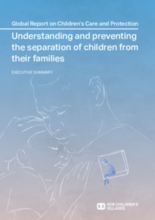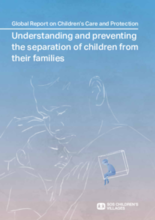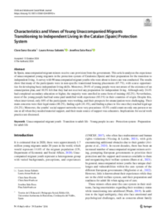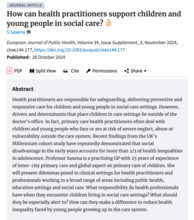Displaying 51 - 60 of 14574
Researching the factors contributing to the separation of children from their families is particularly challenging due to the overrepresentation of higher-income countries in existing literature and the influence of both the objective capacity and subjective perspectives of those recording the reasons for children’s admission to alternative care. This makes it difficult to consistently understand and document the phenomenon.
To address this challenge, the report integrates key findings from a systematic literature review of global research, and it introduces new data from country studies across various income levels, filling gaps in current research to provide a more comprehensive understanding of the factors contributing to family separation and ways to prevent it.
In this report, SOS Children's Villages and partners from 10 academic institutions from around the world, have researched the phenomenon of child-family separation and what can be done to prevent it. This research tries to fill a global gap of information regarding middle and low-income countries, the contexts of which are not well understood.
Join care experienced people (CEP) and supporters from all over the world in a series of online networking events designed to bring good humans together. CEP from South Africa and UK are inviting CEP and supporters from everywhere on the planet to connect - because chance differences of background, geography or circumstances should not matter!
Discover the findings of an extensive global research report highlighting the factors contributing to the separation of children from their families and providing recommendations to prevent this from happening.
This article analyzes the experience of unaccompanied young migrants in the protection system of Catalonia (Spain) and their preparation for the transition to independent living. A survey with 90 unaccompanied migrant youths who were about to leave care was conducted.
Global migration is on the rise, and as a result, millions of children are left in their home countries while their parents migrate abroad. Little is known about the mental health of left-behind children (LBC) in Eastern Europe. The study addresses this research gap in Georgia, a leading migrant-sending country in the region.
This study explores risk and resilience in UK school environments for students in kinship care. Eight professionals experienced in working with students in kinship care and their schools took part in individual, semi-structured interviews. Interviews focussed on kinship students’ needs and how professionals perceive schools respond to those needs.
The author of this article is a practising GP with 25 years of experience of inner-city primary care and a global expert on primary care of children and she presents dilemmas posed in clinical settings for health practitioners and professionals working in a broad range of areas including public health, education settings and social care to help reduce health inequality faced by young people growing up in the UK care system.
This global study explores the intricate web of disadvantages preceding children’s entry into social care, shedding light on the complex interplay between early-life adversity, cumulative disadvantage, and long-term health outcomes and the ways in which intergenerational studies can inform strategies for breaking the cycle of disadvantage.
Case studies from the Global South provide insights on how to effectively support children who have experienced violence.







